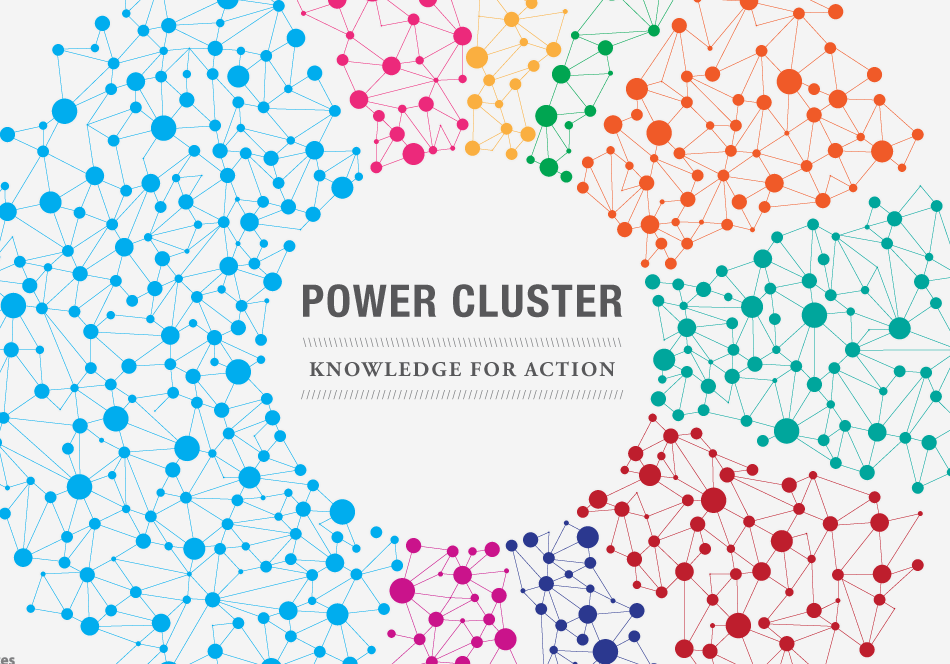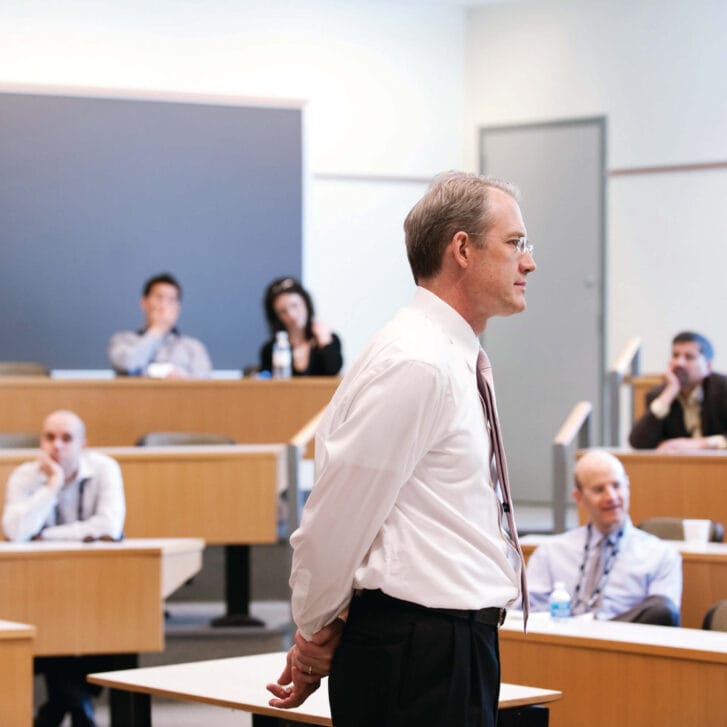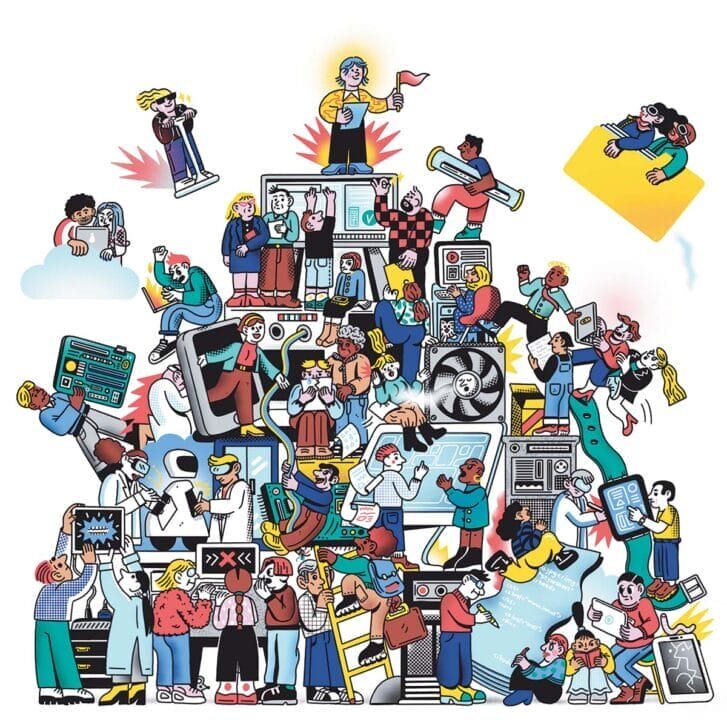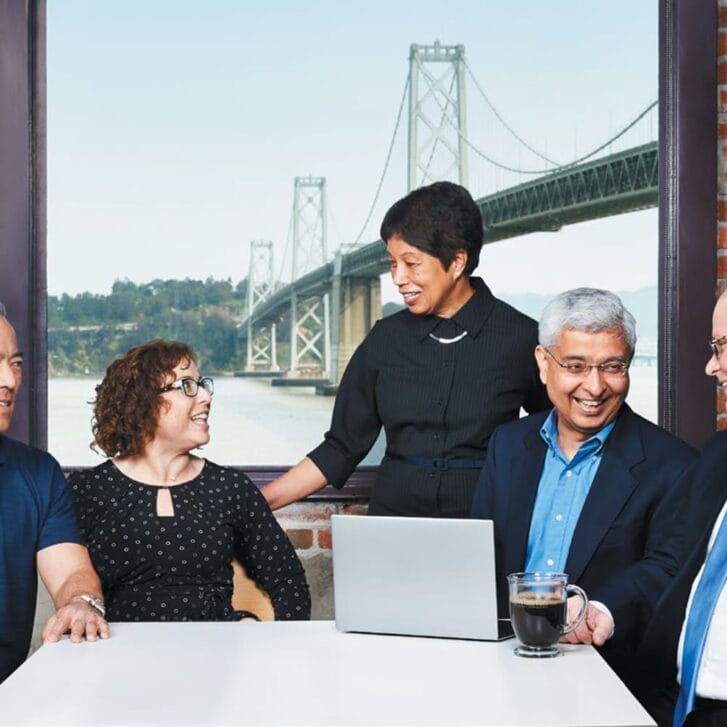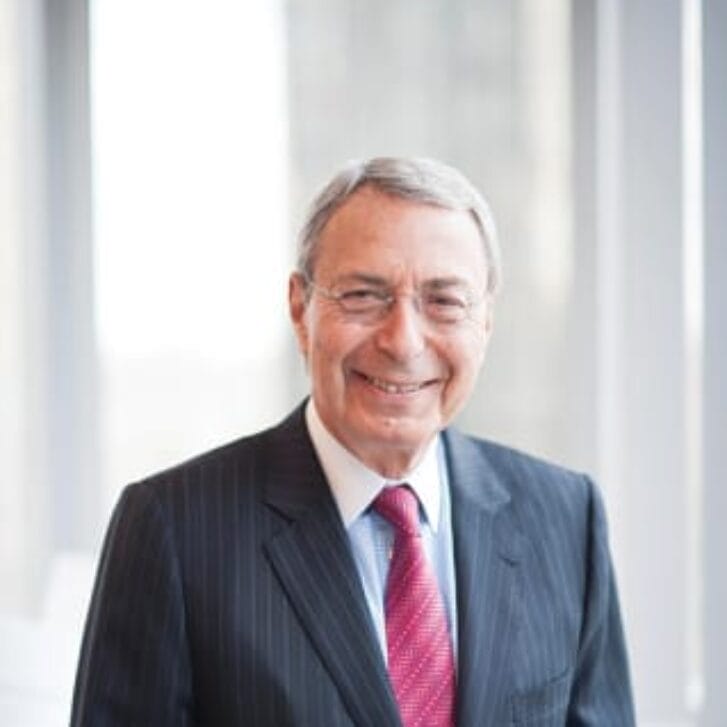Knowledge developed at Wharton reaches millions of students and professionals each year in every field of business or entrepreneurial enterprise. Wharton has one of the most published faculties among business schools worldwide, the largest global alumni network and six language editions of Knowledge@Wharton with more than 1.8 million subscribers.
All of this shared acumen is a vital brand component for Wharton, but it is how that knowledge is translated into action that is the real brand story—often untold.
Wharton knowledge, certainly unmatched in scope, combined with a passionate, entrepreneurial community, creates a very special dynamic: a place where knowledge fuels action—and where its reach and impact are ever-expanding.
An extensive exploration of Wharton’s identity led by Dean Thomas S. Robertson and a team of committed faculty revealed just how central the creation, dissemination and impact of knowledge is to the Wharton brand.
Recently, many business schools have unveiled new positioning campaigns, each one seeking authentic relevance and differentiation in a large, diffuse marketplace. It’s competitive at the top.
Wharton began its own self-examination and analysis in 2009, with a brand and identity initiative to unearth what makes Wharton one of a kind. The result: a shared communications platform that will help us tell the Wharton story in a collective, sustained and effective way—in turn, enhancing and strengthening the Wharton brand.
FINDING CONVERGENCE
When Dean Robertson began his tenure, he had a clear vision: to continue Wharton’s position as the top business school in the world by anticipating the needs of tomorrow’s business leaders. To deliver this level of excellence, everyone within the Wharton community—faculty, students, administrators and alumni—would need to share an understanding of the institution’s core strength.
“A strong entrepreneurial and innovative spirit enables us to be nimble, but it also has a tendency to pull us in different directions,” says Robertson. “I wanted to spark the common understanding of purpose and energy that comes with
brand clarity.”
The project started with a faculty steering committee chaired by George Day, the Geoffrey T. Boisi Professor of Marketing and co-director of the Mack Center for Technological Innovation. The committee embarked on a rigorous two-year process to assess Wharton’s positioning, including: a competitive analysis; a review of Wharton’s existing messaging; in-depth interviews with faculty, students, administrators, alumni and recruiters; and an online survey sent to more than 4,000 stakeholders.
The committee engaged the knowledge of Wharton alumni at the branding firm Prophet, where Kevin O’Donnell, WG’91; Phyllis Rothschild, WG’93; and Chiaki Nishino, WG’00, are partners.
“It was important to be comprehensive,” says committee member John Kimberly, Henry Bower Professor of Entrepreneurial Management and co-author of The Soul of the Corporation, a book on managing the identity of a company. “We explored Wharton’s organizational culture and listened to the views of our stakeholders to find what resonates across audiences.”
“We heard consistencies in how people think of Wharton,” says Katherine Klein, Edward H. Bowman Professor of Management and a member of the committee. “We heard terms like ‘knowledge,’ ‘analytics,’ ‘rigor.’ At the same time, we heard that Wharton faculty and students are diverse, that we have impact, and we’re global.”
Adds Patti Williams, Ira A. Lipman Associate Professor of Marketing, “It was a remarkable exercise to turn the lens on ourselves. We brought the same rigor and analysis we bring to our research, gathering and then filtering many perspectives and experiences to get to a shared setof Wharton values.”
To find an expression that would authentically capture the Wharton experience, the branding team turned to the community for inspiration. With the help of Karl Ulrich, CIBC Professor of Entrepreneurship and Ecommerce and vice dean for innovation, the branding team launched a crowd-sourcing tournament modeled on the methods put forth in Ulrich’s recent book Innovation Tournaments. Students and alumni were asked to submit taglines and themes. Not surprisingly, the submissions were as varied and diverse as the community itself, but one idea rose to the fore: Wharton knowledge creates consequence in the world.
To deliver this idea simply and powerfully, the team settled on a flexible message platform that could be adapted to meet the needs of all our stakeholders. To stay targeted, they defined a set of themes that place emphasis on the impact created by Wharton knowledge—and the meaning Wharton makes in the world at large, including: Knowledge for Action, Knowledge for Global Impact, Knowledge for Innovation and Knowledge for Life.
“This messaging works because of our scale and scope,” says committee chair Day. “Wharton has the greatest breadth of knowledge of any business school in the world, and we see it applied every day across the world and in our community.”
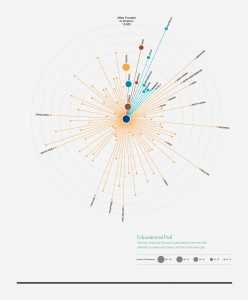
Educational Pull: Wharton Executive Education participants come from 88 different countries and travel 3.8 million miles annually.
KNOWLEDGE FOR ACTION
The faculty know firsthand that Wharton knowledge is rooted in evidence and developed in a dynamic culture that inspires leadership—thus, leading to real consequence in the world, just as founder Joseph Wharton envisioned.
Wharton faculty are committed to knowledge born of complex research and careful analysis. Using a great deal of gathered data and analyses from a variety of perspectives, they use their expertise to come to conclusions—and expect the same from students. They possess the broadest and deepest expertise on business knowledge, reaching across disciplines as diverse as public policy, health-care management and ethics. Their work allows business leaders to act on evidence, not just instincts.
One example is Klein’s research about how to get the most out of teams. Klein’s research revealed that, when dealing with diverse values, task-oriented leadership yields greater team effectiveness than relationship-oriented leadership.
“It’s not about which management style is in vogue,” she says. “It’s about what works.”
Alumni have built their careers on an evidence-based approach leading to innovation. Wharton alumni, Bruce I. Jacobs, G’79, GrW’86, and Kenneth N. Levy, WG’76, G’82, celebrated 25 years of their firm last year. At its inception, the firm emphasized a then revolutionary notion that the investment world should act on research that stems from academic concepts and tools.
“An increasingly complex world requires the tools that quantitative research can provide,” Jacobs told Wharton Magazine (see “Calculating the Impact of the New Quant Finance Center,” Fall 2011, P. 28-33).
KNOWLEDGE FOR INNOVATION
Wharton has a unique and differentiating “personality”: driven, dynamic and entrepreneurial. Wharton encourages students to pursue their own interests and passions, and creates an environment that celebrates experimentation, entrepreneurship and innovation.
Adam Stein, WG’05, values the synergy that happens at Wharton when people and knowledge come together. Stein started his MBA with experience at Silicon Valley startups and graduated as a full-fledged technology entrepreneur. While still a student, he and some classmates launched TerraPass, a clean-tech company.
“It’s not only about what you learn, but how you learn and who you learn it with,” says Stein.
For his newest company, Gridium, an energy management company, Stein says he relied on his business-school education to make fundamental decisions about pricing, market-entry strategy and product design, as well as more creative decisions like choosing a name and marketing.
“Wharton shows you how to put it all together and work with others to make something new,” he says.
Introducing a new product or entering a new market may seem risky in today’s volatile economy, but a new course hosted through Wharton’s Aresty Institute of Executive Education emphasizes the importance of action in the face of uncertainty. Harbir Singh, Mack Professor of Management, co-director of the Mack Center for Technological Innovation and vice dean of global initiatives, notes that the global nature of the economy increases an organization’s opportunities, which also increases complexity and ambiguity.
“Decision-makers must be able to position their firms to assess advantages and challenges that might develop anywhere in the world,” says Singh, who serves as the academic director of the new Global Strategic Leadership Program.
“Your strategic approach and how you work with others may have to change, but you can’t wait to know everything before moving forward. The successful business is the dynamic one,” Singh says.
KNOWLEDGE FOR THOUGHTFUL LEADERS
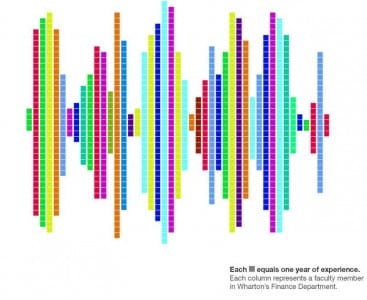
Finance Frequency: Wharton’s finance professors bring more than 1,000 years of collective teaching experience.
Many people take on leadership roles and then lead in a way that makes no tangible, measurable difference. When Joseph Wharton put forth his vision for a school of finance and commerce that would educate “Pillars of the State, whether in public or private life,” he laid the foundation for the Wharton School to train thoughtful leaders who would instigate positive, dynamic change in their organizations and in the greater society.
“When you talk about knowledge for action, it’s really about using knowledge to lead,” says Janet F. Clark, WG’82, Marathon Oil executive vice president and chief financial officer. “The biggest thing I got out of Wharton was learning leadership skills.”
Clark says she grew into taking on leadership roles as a student, first in smaller groups before becoming more confident and vocal in the classroom. Today, she is one of only a handful of women in top leadership positions in the energy industry.
“Wharton trains values-centered, action-oriented leaders who understand that success is about translating knowledge into desired results,” says Clark.
Leadership learning is central to the Wharton experience. All first-year MBA students start with cutting-edge leadership learning in a required core course in teamwork and leadership. MGMT 652 uses technology to create an online simulation experience, allowing students to act as senior management at a fictitious startup. Undergraduate students also begin with leadership learning in MGMT 100, in which students work in teams on consulting projects with local nonprofits. Lessons learned from unexpected situations each student team faces, as well as the experience of consensus-building and decision-making, are directly applicable to the real world.
KNOWLEDGE FOR LIFE
“Joseph Wharton had the radical idea of founding the world’s first business school more than 130 years ago, and we have to continue to think proactively to stay on top,” Robertson says. “By reconfiguring the MBA curriculum and launching the Lifelong Learning initiative, we are ensuring that Wharton remains at the vanguard of business education.”
In the Lifelong Learning initiative, currently being piloted, alumni will continue developing skills and knowledge—sharing insights in one of the largest and most powerful business networks in the world. Educational offerings and experiences that leverage alumni practitioners, expert faculty and scholarly research will create new opportunities and value for alumni as their careers progress. The knowledge they gain will be the same high-caliber knowledge they received as students at Wharton.
Similarly, the new curriculum for the MBA program, launching in August with the incoming class of 2014, will prepare students to lead in an uncertain and complex global marketplace. The new curriculum offers greater flexibility for students to follow their career paths, transforms leadership education with a 360-degree feedback and coaching program, and is built on a structure that allows for quicker development of courses in the face of new global opportunities and challenges.
Meanwhile, the highly lauded Knowledge@Wharton, now with 1.8 million subscribers, continues to serve the broader business community with analyses of trends, interviews with industry leaders and articles based on the latest research. A singular vision and clarity of purpose keep it growing and appealing to new audiences, for instance, with the launch of Knowledge@Wharton High School.
“What makes Wharton such a global powerhouse is its people,” says Robertson. “Our faculty, students and alumni collectively develop the knowledge and abilities that enable organizations to run effectively and efficiently.”
He adds, “This productivity leads to greater economic and social welfare, making business a ‘force for good.’”
The ultimate measure of Wharton’s success is how its broad and deep knowledge transforms industries around the globe. With 88,000 alumni in 150 countries, and 225+ faculty teaching 5,000 students every year, it seems the potential of knowledge for action is limitless.
DEVELOPING THE COMMUNICATIONS PLATFORM
Once Wharton’s new core positioning was established, according to committee member Williams, “the next challenge was to take the concept from abstraction to something that we could use across the School in our communications.”
The committee established a two-part communications platform: a defined set of messages and a graphical treatment. The messages can be used for different audiences while conveying the same shared theme. For example, the phrase “knowledge for global impact” can be used when addressing Executive Education clients, “knowledge for life” is relevant for a Lifelong Learning event and “knowledge for innovation” describes the work of the research centers.
“Rather than a one-size-fits-all tagline, we have a flexible system for expressing Wharton’s brand,” says Williams.
The second element of the communications platform is a series of meticulously designed infographics that use quantitative and qualitative data to depict the impact of Wharton knowledge.
“The power of an infographic is that it takes otherwise seemingly dull or disparate information and creates a visually appealing product that fosters an understanding of the story. Each Wharton infographic is an ownable expression of data that contains layers of information, showing the unparalleled consequence that the institution has in the world—a perfect representation for a brand built on rigorous analysis,” says Ira Rubien, executive director of marketing and communications for the School, and committee member.
Karma, a Philadelphia-based communications agency, designed the campaign. The differentiating new infographics were created by award-winning graphic designer Carl DeTorres. It will become a signature look for Wharton across all School communications.




















